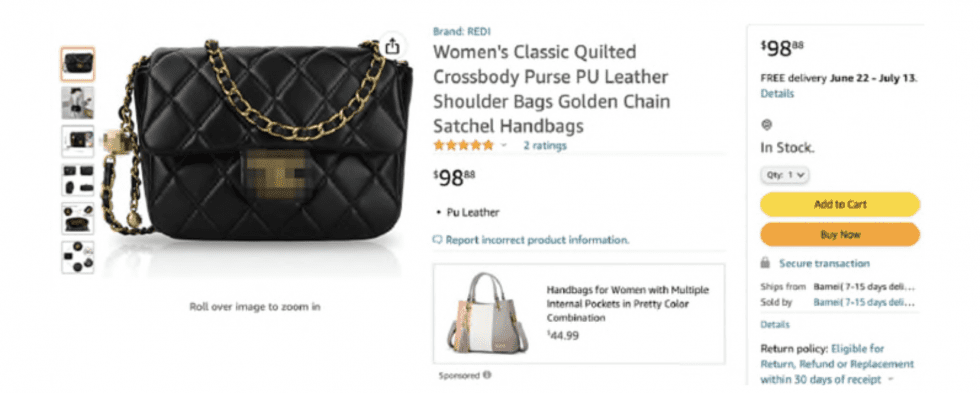Amazon and Salvatore Ferragamo S.p.A. nabbed a win in the latest round of a joint effort to crack down on counterfeit goods. In a decision late last month, a federal judge in Washington held that Guoxin Dai “deceptively sold counterfeit Ferragamo-branded products on Amazon,” and accordingly, granted the e-commerce titan and Italian fashion brand’s request for a permanent injunction to block the Chinese individual from offering up counterfeit goods – including fake Ferragamo accessories – on Amazon, as well as their bid for almost $130,000 in statutory damages (the sum of Dai’s aggregate sales of counterfeit products on Amazon multiplied by three).
In his order on September 26, which follows from an order of default this summer, Judge Ricardo Martinez of the U.S. District Court for the Western District of Washington stated that “having considered the record in this case, including Defendant Guoxin Dai’s failure to appear and the court’s entry of an Order of Default,” the court granted the plaintiffs’ motion for a default judgment and entered a permanent injunction against the defendant.
Considering the four-factor test from eBay Inc. v. MercExchange (irreparable injury, adequacy of legal remedies, balance of hardships, and public interest), Judge Martinez determined that an injunction is warranted. The judge held, among other things, that Dai “has no legitimate interest in counterfeiting Ferragamo’s products and selling them on Amazon’s platform,” and that his failure to appear “suggests that [he] is likely to continue to infringe on the Ferragamo trademarks, thus, compounding the irreparable injury to [the plaintiffs’] business, market, reputation, and goodwill.”
While the court granted Amazon and Ferragamo’s motion for a permanent injunction, Judge Martinez struck their proposed injunction – which aimed to enjoin the defendant’s “officers, agents, representatives, servants, employees, successors, and assigns, and all others in active concert or participation with him” – on the basis that it was overbroad. Instead, the court exclusively enjoined “only those against whom the clerk entered an Order of Default: Defendant Guoxin Dai.”
Amazon’s Efforts
The bigger picture here is the interesting part. The Ferragamo cases (which were previously consolidated into one) come amid enduring efforts by Amazon to address the supply of counterfeit – or otherwise infringing – goods on its marketplace platform. Back in 2016, for instance, Amazon first piloted its Brand Registry program, followed the IP Accelerator, Transparency, Project Zero, Counterfeit Crimes Unit, and most recently, its Anti-Counterfeiting Exchange, which was introduced this year. At a high-level, these initiatives are all aimed at blocking and/or removing infringing goods from Amazon’s site.
In tandem, Amazon has been increasing its level of litigiousness. Last month, for instance, the Seattle-headquartered retail behemoth made headlines when it filed two lawsuits against Kamryn Russell and Ashley Hawat, alleging that the two individual Amazon sellers and their co-conspirators “knowingly attempted to evade Amazon’s brand protection systems” via a scheme involving “hidden links.”

Those newly-filed lawsuits mirror a headline-making case that Amazon waged against two influencers in 2020 for using “hidden links” on their social media pages to direct followers to Amazon product pages that appeared to list generic handbags (as a way to evade detection by Amazon) but that actually consisted of counterfeit goods. That lawsuit resulted in a settlement, in connection with which the two “dupe influencers” were prohibited from offering up any products on Amazon “without express written authorization.”
Amazon has also filed dozens of similar joint lawsuits with brands like Cartier, Canon, HanesBrands, World Wrestling Entertainment, Yeti, GE, and Weber, among others. And all the while, Amazon stated in a June 2022 report that it has blocked billions of counterfeit listings before they ever made it onto its marketplace, employs more than 15,000 people who are “dedicated to protecting customers, brands, selling partners, and our store from counterfeit, fraud and other forms of abuse,” and has devoted more than $1 billion in its fight against fakes.
These Amazon-initiated lawsuits and other anti-counterfeiting efforts comprise a bigger endeavor by Amazon to build trust.
The company is likely not just focusing on amassing goodwill among consumers, though. In fact, in a November 2022 survey, Clarify Capital found that Amazon is the “most trusted” brand in the U.S., with more than 50 percent of respondents across each of the generations of consumers surveyed saying that they find Amazon to be a trustworthy retailer. Against this background, it seems that Amazon is likely catering (in no small part) to brands – and helping them to address the infringing goods on Amazon – in light of continued growth in the broader market for counterfeits.
And as we have speculated in the past, such consistent attempts by Amazon to curb the presence of counterfeits on its site might also be a nod to its desire to onboard more companies to list their products on its marketplace, including those in the luxury realm, where it has made inroads by way of its Luxury Stores venture and partnerships with the likes of luxury reseller What Goes Around Comes Around.
The cases are Amazon.com and Salvatore Ferragamo v. Jun, et al., 2:21-cv-00171 (W.D. Wash.), and Amazon.com and Salvatore Ferragamo v. Yong, et al. 2:21-cv-00170 (W.D. Wash.).











